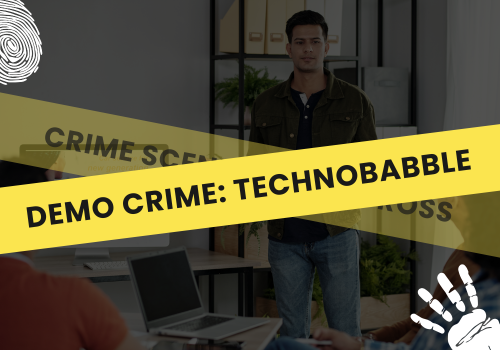Stories That Stick: How To Be Remembered In Any Room
There's a moment in every software demo when you can feel the audience slip away. Maybe it's the glazed look when you dive into feature number 47, or...
In the fast-paced world of sales and presales, a great demo can make or break a deal. Yet time and again, teams fall into the same traps—classic "demo crimes" that leave buyers confused, unengaged, and ultimately unconverted.
In a sales and presales function, demo crimes are considered especially heinous. The dedicated demo detectives who investigate these presentation felonies are an elite squad of facilitators, executives, and presales leaders. These are their stories.
Let's set the scene: A solutions architect joins a call with no background on the prospect, no discovery, and no plan. The account executive simply says, "Do what you normally do." Sound familiar?
This classic demo crime is often committed not by presales or solutions engineers who are delivering the solutions, but by account executives who bring them in cold. It occurs when an AE brings a solutions architect into a demo without context and expects them to magically deliver a winning presentation.
Solutions architects have no plan, no context, and therefore are unable to craft a structured approach to showing solutions and benefits that secure buy-in. Instead of getting a briefing on prospect pain points and organizational objectives, they're expected to give a one-size-fits-all performance that applies to no one.
Here's the thing: regardless of how versatile your product is, buyers are coming to you to solve their unique problems. An unprepped presales pro will probably deliver a decent demo because of their product expertise and ability to perform discovery on the fly. But here's what you're missing—had they been prepped, you could be asking for support and closing a deal during that very demo.
Yes, your product is powerful and flexible. And yes, your presales team is smart and agile. But without a clear roadmap, your buyer doesn't get the tailored experience they need. There must be a plan so that presales can solve the problems that matter most to the prospect.
This is a straightforward crime that happens all too often. An account executive brings a presales engineer into a call with a healthcare company looking to improve patient data management. The AE makes introductions without any context and says, "Do what you normally do."
The presales engineer launches into a generic demo, showcasing features but failing to customize the presentation to the prospect, completely missing the mark on the client's specific needs. What follows is a technically sound but completely generic demonstration. The client leaves the engagement with more questions than answers, and without any plans to follow up.
Here's the reality: presales professionals are experts on software solutions. More often than not, they're able to perform discovery and customize on the fly. However, the buyer experience suffers dramatically.
Even if the presales engineer does a great job improvising, buyers have to repeat themselves and feel unheard. They may question whether your team truly understands their business. This places undue pressure on presales to win credibility and trust from scratch, since the account executive has given them no direction to work with.
Avoiding the "Do What You Normally Do" crime requires collaboration, preparation, and a clear understanding of what matters to the prospect. We can't state this enough: context is everything.
Preparation is everything, and it starts with communication:
Always schedule a discovery or prep call before the demo. Open communication ensures that account executives share pain points, desired outcomes at different organizational levels, and relevant audience insights.
Share what you know. AEs should provide details on the prospect's goals, industry pain points, team roles, and the specific language they use.
Define success. What does the buyer want to see in this demo? What does a win look like for them?
Agree on structure. Work together to decide who's saying what and when.
If you find yourself in a situation where you're brought in without context (we've all been there), pivot to quick discovery on the fly. Ask smart questions early, focus the demo on 1-2 features that you know can work for their situation, and promise a personalized follow-up. A short video demo or tailored walkthrough sent later can keep the conversation alive and show you're listening to their specific needs.
The "Do What You Normally Do" crime isn't just about losing deals, it's about breaking down the relationships between sales and presales teams. When presales pros are constantly thrown into the hot seat without support, it strains departmental relationships and creates long-term organizational challenges.
But here's the good news: this is completely preventable. When teams work together with proper preparation, the buyer feels it—and that's what turns demos into deals.
Your action item: Starting today, institute a simple 15-minute pre-demo briefing between AEs and presales before every demo. Share the prospect's key pain points, desired outcomes, and what success looks like. This small investment will transform your demo effectiveness immediately.
2Win helps sales organizations align their teams and deliver award-winning demos. Ready to stop committing demo crimes? Let's talk.
There's a moment in every software demo when you can feel the audience slip away. Maybe it's the glazed look when you dive into feature number 47, or...
The Demo Death Trap: How Meandering Kills Your Software Presentation

Demo Crimes for Modern Times: 2Win Demo Detectives Uncover Fresh Insights on Old Crimes